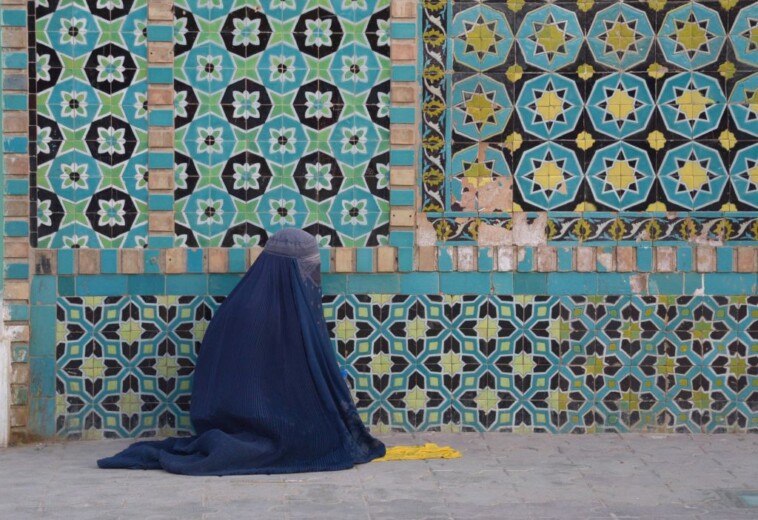The Taliban has banned women in Afghanistan from hearing each other’s voices in what experts say is its latest step toward erasing “women entirely from public life and society”.
The country’s Minister for the Promotion of Virtue and Prevention of Vice, Khalid Hanafi, announced the new edict on female behavior.
“Even when an adult female prays and another female passes by, she must not pray loudly enough for them to hear,” he said in his message.
A woman’s voice is considered “awrah” – meaning that which must be covered, and shouldn’t be heard in public – Mr Hanafi said.
“When women are not permitted to call takbir or athan [Islamic call to prayer], they certainly cannot sing songs or [make] music,” he said.
“How could they be allowed to sing if they aren’t even permitted to hear (each other’s) voices while praying, let alone for anything else.”
The exact details of the Taliban’s new ruling are unclear, though the minister said it “will be gradually implemented, and God will be helping us in each step we take”.
Human rights activists in both Afghanistan and abroad, however, have warned this latest measure by the Taliban could mean women are effectively banned from holding conversations with one another.
“It is hard to imagine the situation getting worse after the Taliban banned women’s voices and faces in public last month, but with this latest decree, we have seen that the Taliban’s capacity to inflict harm on women has no limits,” Zohal Azra, from the Australian Hazara Advocacy Network, told news.com.au.
“Since returning to power in Afghanistan the Taliban has effectively erased women and girls from public life in methodical, and systematic approach involving over 105 decrees, edicts, and orders that are enforced violently and arbitrarily, including through detention, sexual abuse, torture and cruel, inhuman, or other degrading treatment and punishment such stoning and whipping women and girls.
“The situation is so dire that it requires urgent global intervention to support women in Afghanistan.
“Through these decrees the Taliban has established a system of gender apartheid.”
Amnesty International Australia’s Strategic Refugee Rights Campaigner, Zaki Haidari, told news.com.au that the situation for women and girls in Afghanistan is “growing darker by the day”.
“The Taliban is methodically punishing women, seemingly testing how far they can push before the world responds,” Mr Haidari, who is of Hazara background, said.
The world has “remained largely silent” since the early days of their regime, Mr Haidari said, and now “feels empowered, believing they have the power to erase women entirely from public life and society”.
As one woman, a former civil servant who lives in Kabul, told The Telegraph, the Taliban “are waging an all-out war against us, and we have no one in the world to hear our voices”.
“The world has abandoned us. They left us to the Taliban, and whatever happens to us now is a result of Western government policies,” she said. “I feel depressed. The world is advancing in technology and having fun with their lives, but here we cannot even hear each other’s voices.”
Mr Haidari echoed the sentiment that Afghanistan has been “abandoned” by the rest of the world.
“After 20 years of war led by the US and its allies in the name of democracy and freedom, their departure feels like a betrayal,” he said.
“If these nations had taken their responsibilities seriously, they wouldn’t have left the Afghan people at the mercy of a terrorist regime.
Start and end your day informed with our newsletters
Morning Report and Evening Update: Your source for today’s top stories
Thanks for signing up!
“Women, in particular, are now being murdered, raped and erased from society with little meaningful intervention from the international community.”
As the Taliban’s oppression worsens, Human Rights Watch Australia director, Daniela Gavshon, told news.com.au it is “critical for governments claiming to support human rights and accountability to move from words to action”.
“We are seeing states try and put pressure on the Taliban through new, previously unused avenues – like trying to hold the Taliban to account for their serious violations of the rights of women and girls under the Convention on the Elimination of All Forms of Discrimination against Women (CEDAW),” she said.
“Yet while some states are trying, they need to do more.”
Last month, Australia, Canada, Germany and the Netherlands formally accused the Taliban of gender discrimination, in a case that will be taken to the International Court of Justice (ICJ), based in The Hague.
The case is the first legal move of its type since the Taliban’s takeover in 2021, and is also believed to be one of the first gender discrimination cases considered by the ICJ.
In a statement at the time, Australia’s Foreign Minister Penny Wong said the four countries would not “stand by and allow the situation in Afghanistan to become a ‘new normal’”.
“The Taliban has demonstrated contempt for the human rights and fundamental freedoms of women and girls in Afghanistan, through a campaign of sustained and systematic oppression,” Senator Wong said.
While this was “a welcomed step”, Ms Azra pointed out, “Australia was among the first countries in the world to join the war in Afghanistan”.
“We also played an outsized role in the war in Afghanistan, made many promises to Afghan women, and as a result we have a clear, moral obligation to support the women of Afghanistan,” she said.
“The Australian Government must match its outsized role in the war in Afghanistan, and promises to the people of Afghanistan with actual material support for women and girls under the Taliban rule.”
Such measures include “referring to the Taliban’s treatment of women and girls as gender apartheid”, ensuring that our humanitarian aid contributions to Afghanistan are “strictly conditional upon the improvement of human rights”, and making “greater use of its influence in international bodies like the UN to advocate for resolutions and sanctions against the Taliban regime due to their policies on women”, Ms Azra suggested.
“Now, more than ever, the women of Afghanistan need the world’s attention,” Mr Haidari said.
“We must amplify their voices and advocate for their basic human rights and very existence.
“While there are many crises unfolding across the globe, we must not forget the people of Afghanistan, especially the women, who are being silenced and oppressed.
“It is our collective responsibility to stand with them.”





